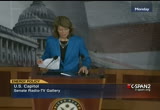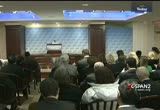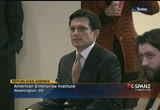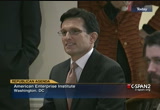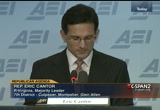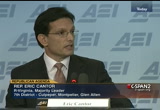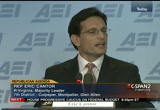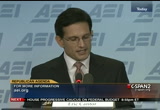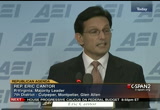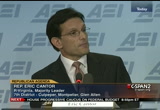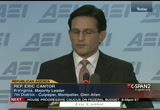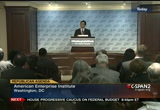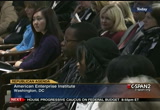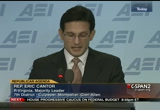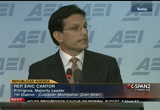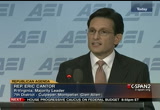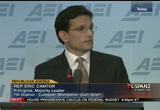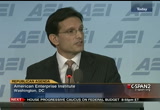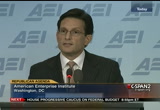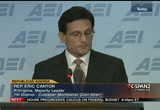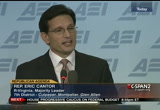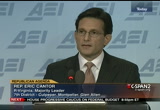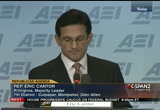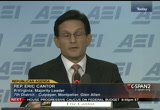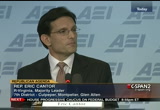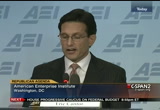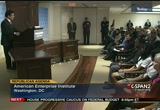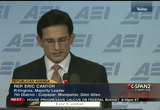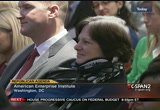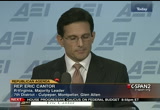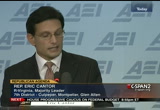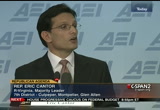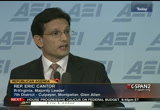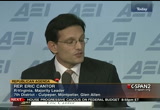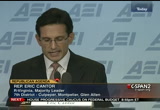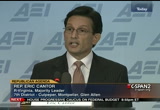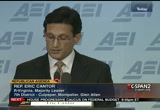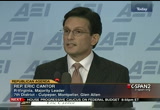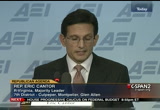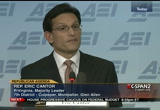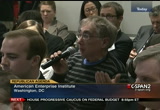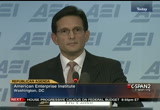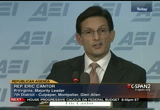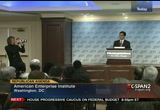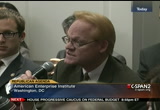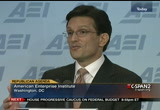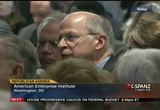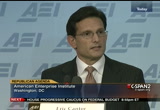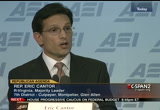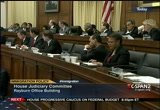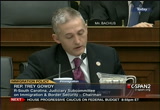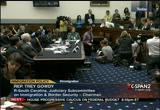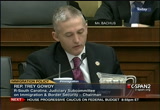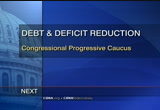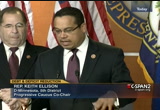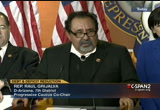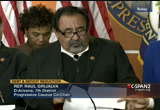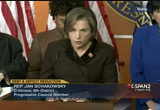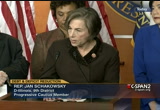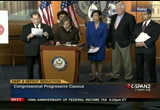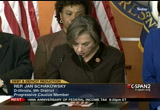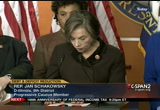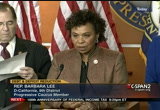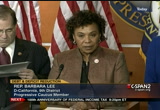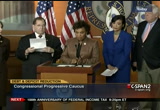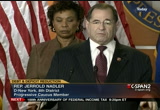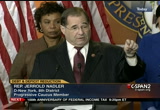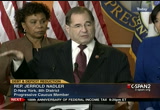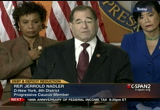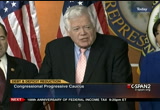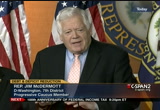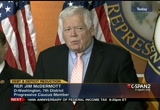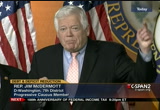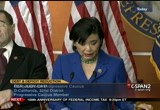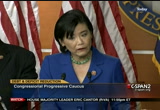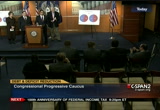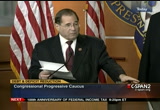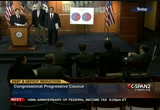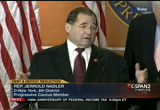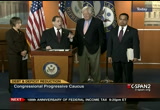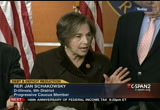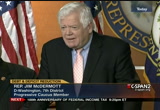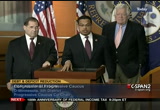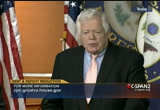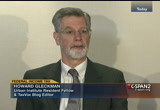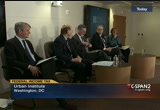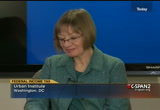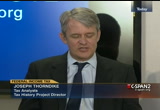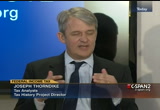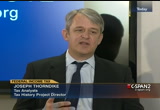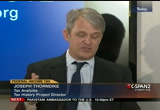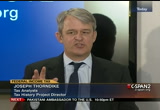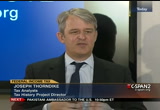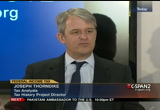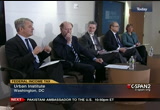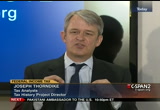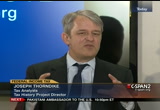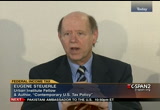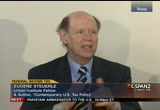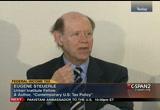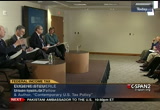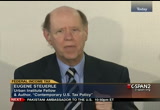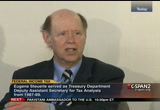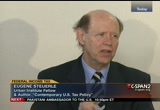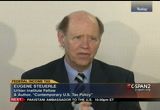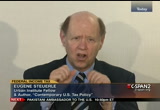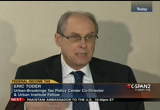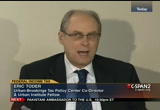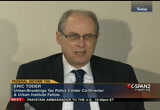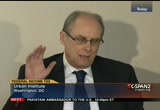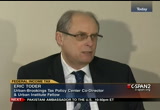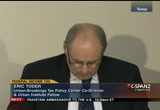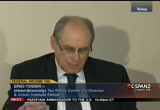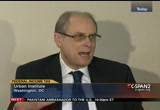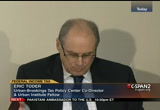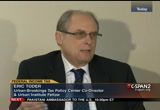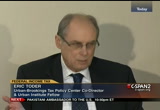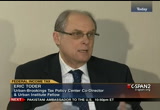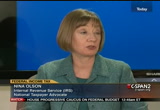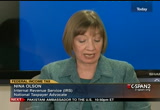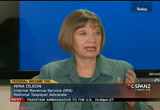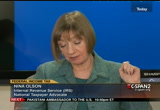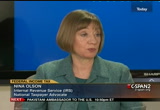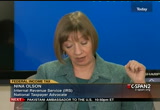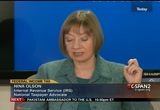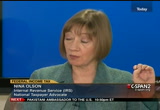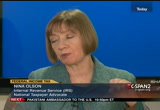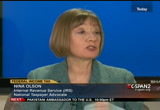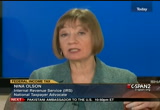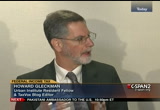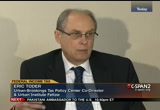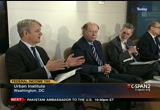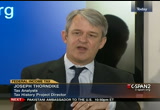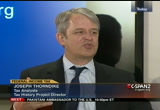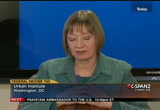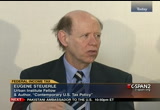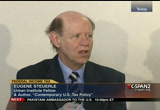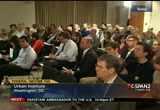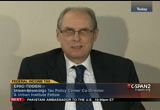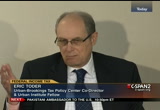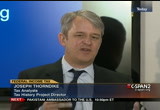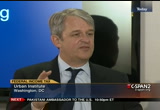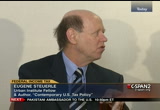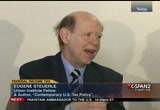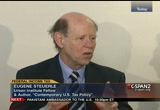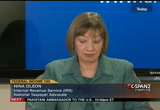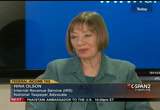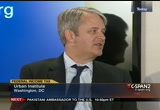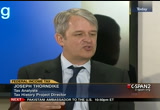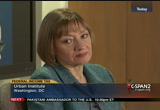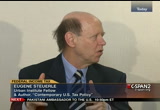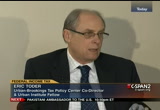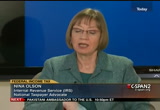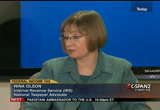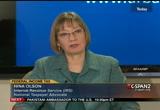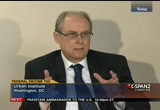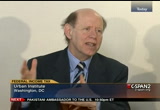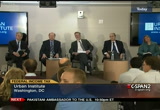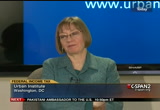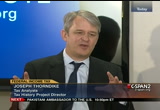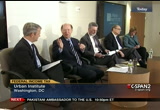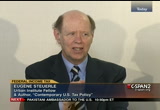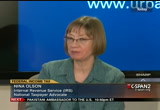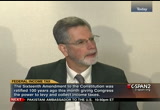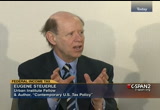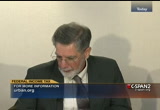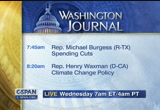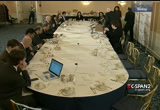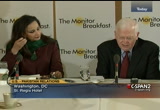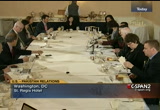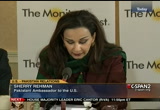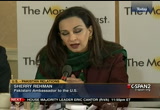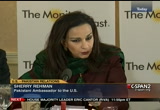tv Tonight From Washington CSPAN February 5, 2013 8:00pm-11:00pm EST
8:01 pm
this is 45 minutes. [inaudible conversations] >> good afternoon. aim pleased to welcome eric cantor to aei today to make a speech entitled,making life work. an ordinary introduction would chronicle eric's incredible political rear and rise to majority leader and talk about his legislative accomplishments, but eric's career is not a collection of accomplishments. it's a long-term effort to make a better, fairer, country for all americans. eric is someone who regularly pauses to remember the why of public policy, valuing justice for all, protecting the vulnerable, and fighting against
8:02 pm
class divisions in american life. he cares about freedom and opportunity because he knows they lead to a happier, more prosperous life for more people. he cares about those being left behind by failing schools. people looking for work and not finding it. people who face barriers to starting businesses and building a better life. eric canner to knows between each legislation is an american or someone who wants to become an american. here's the around i admire eric the most. he fights for everyone, whether they're going to vote for him or not. and we're very honored to have him here today to hear his thoughts. after his remarks, he'll take a few questions. ladies and gentlemen, house majority leader eric cantor. [applause]
8:03 pm
>> thank you very much. it is great to be here at aeei. i'm such an admirer, are thousand of what you do. you have done so much to, i think, put into context what it means to be a conservative and how conservative policies actually help people, and i do think that your insight and commitment in this vein has only begun to reap rewards, and i look forward to continuing the fight with you to try to make a better life for all americans. so, thank you very much for hosting this today. in washington, over the past few months, our attention has been on cliffs, debt ceilings, budgets, deadlines, and negotiations. all of this is extremely important. because i don't think there's any substitute for getting our fiscal house in order. there's no greater moral imperative than to reduce the mountain of debt that is facing
8:04 pm
us, our children, and theirs, and our house republican majority stands ready for the president and his party to join us in actually tackling the big problems facing this country. but today i'd like to focus on what lies beyond the fiscal debate. and over the next two years, our house majority will pursue an agenda that is based on a shared vision of creating the conditions of health, happiness, and prosperity, for more americans and their families. and to restrain washington from interfering in those pursuits. we'll advance proposals aimed at producing results in areas like education, health health, innovation, and job growth. our solutions will be based on the conservative principles of
8:05 pm
self-reliance, faith in the individual, trust in family, and accountability in government. our goal is to ensure that every american has a fair shot to earn success and achieve their dreams. it's my hope that i can stand before you two years from now and report you that our side, as well as the president's, found within us the ability to set differences aside in order to provide relief to so many millions of americans who just want their life to work again. in so many countries in history, children were largely confined to the same station in life as their parents, but not here. because here we've seen the son of a shoe man become the president of the united states. we have seen a daughter of a poor single mom develop and
8:06 pm
build a company that turned into her being the oregon of a tv network. in america, the grandson of poor immigrants, who fled russia, come here, and that grandson became the majority leader of the house of representatives. that's what this country is about. [applause] in kitty hawk, north carolina. two bicycle shop mechanic gave mappedkind the gift of flight. the wright brothers flew only 22 feet at that time. 18 feet in the air. but they performed a miracle. as a result, only 66 years later, this country put a man on the moon and brought him back. that's who we are. we can do an enormous amount as a people. the wright brothers' father
8:07 pm
milton inspired his sons by giving them a toy helicopter. he never, ever wanted his two sons, orville and wilbur to fly together for fear that he would lose them. and seven years after the original flight, in 1910, milton gave them permission to fly together. the only time they if did. and it lasted six minutes. now, later that day, orville took his 82-year-old father up into the air. it lasted seven minutes. rising 350 feet at that time. while milton shouted, higher, orville, higher. i think it's a great testament to what our country is about, because in america, we do have higher expectations for our nation, just like milton had higher expectations for his son. since our founding we believe that we could be the best hope
8:08 pm
to mankind. that hope led generations of immigrants to risk everything to endure a tough journey to come to our shores. and the driving motivation for the millions of immigrants, passing by lady liberty in new york harbor, was the generation that came after them. and because of that hope, those high expectations, coupled with the determination to see them through, every generation since has had it better, up until now. lately it's become all too common for us to hear parents really fear that their kids are not going to have it better than they. and for all of us parents, that is a scary thought. let's face it. it's gotten a lot tougher to raise a family in america. and our goal has got to be to eliminate this doubt gripping our nation's families, and to
8:09 pm
restore their hope and confidence so that they, be parents, can once again see a bert tomorrow for their children. you know, together my wife, diana, and i, have raced our three children, evan, jenna, and mikey, and we couldn't be more proud of the young adults they have been. our nest is now empty about i cantle you i understand we both do, the pressures that all parents are under and the tough times they're going through. parents working. saving for college. paying for braces. helping with homework. shoveling from one -- shuffling from one afterschool activity to the next. it's not easy. that's while we worry so much. where can you afford a home in the best neighborhood so your kids will have the right schools? which healthcare plan can you afford so you can see your doctor? will your children actually make it through all those nights of homework and graduate from school and if so, get into a
8:10 pm
college? and then are you going to be able to afford it? what about a career? is that going to be available to them? these are all real life concerns. this is what keeps parents awake at night. fearful that life is not going to work out the way they hoped. during the last several years, with the stagnant economy, too many mothers and fathers have had to come home, walk into the kitchen, and tell their family they didn't have a job anymore. now, how is a family like that supposed to save for a rainy day when it just got tough to even make it through the next month. these are the families that should be our focus. they're desperate to have the nightmare over. and the best way to ensure their hope for the future is restored, is by making reality -- making opportunity a reality for them. and it's going to come if we
8:11 pm
provide a path forward, give them the tools to take advantage of growing economy. we need to see business expansion and startups created so there can be more jobs and opportunity for their kids and for them. now, just like parents, washington has got to start showing care for the generations ahead, while leaving the parenting to the parents. now, government policies got to strike a balance between what is needed to advance the next generation, what we can afford, what is a federal responsibility, and what is necessary to ensure our children are safe, healthy, and able to reach their dream. now, opportunity and belief in tomorrow starts with an education system that works. and in 1822 letter, thomas jefferson wrote, i look to the diffusion of light and education
8:12 pm
as the resource to be relied on for ameliorating then, promoting the virtue advancing the happiness of man. with an eye toward mr. jefferson's vision, since 1965, the federal government has poured hundred0s billions of dollars to improve schools, especially in low-income areas. over $15 billion last year, and frankly the results have not matched the investment. joining us here today is joseph kelly and his family. now, joseph is a heroic dad in my book. he was worried the public schools were not helping his son, who is here in the front row. by the fifth agreed he was three years behind on most subjects. the school actually put him in a special education class, and joseph would try and sit in on the classes in order to help his son. but was met with hostility by
8:13 pm
school administerrors and even had to obtain a court order so ray could have a tutor. violence was so previous leapt in ray's school that there were eight d.c. police officers patrolling it on a daily basis. mr. kelly heard of the d.c. opportunity scholarship program, and dedicated himself to making sure that ray and his three sisters could have access to a school that would provide them with a safe environment in which to learn. to give them an opportunity, in fact, so they could see college as an option. an opportunity that mr. kelly did not have. within two years at a private school, ray caught up to his classmates, and is now a student in college. and his sisters, who are here with us today as well, are attending the preparatory school of d.c.
8:14 pm
and are on a similar path to opportunity. now, i visited this school yesterday. it is amazing. it is making a real difference in the lives of kids who, without that school, could possibly be lost. and this is what is at stake. because now they have great teachers, terrific administrators, small class sizes, and a mission that said every kid's got to succeed. now, no one should deny ray or his sisters this opportunity. [applause] >> joseph kelly, nor any parent should have to wait for failed education systems, failed school systems, to get their act together. throughout the country, there are some promising signs that we can bring schools and parents together to improve our educational system. san francisco public schools. adopted a funding mechanism
8:15 pm
according to what is termed a weighted student formula, and under this policy the more students a school attracts the more money the school, it administrators and teachers receive. low income students are weighted heavier in the funding, as are children with disabilities, and those learning english as a second language. so there's incentives for schools to seek the more vulnerable population and reasons for schools to differentiate themselves and to excel. imagine if we were to try and move in this direction, with federal funding. allow the money we currently spend to actually follow individual children. students, including those without a lot of money, or those with special needs, would be able to access a school which would give them a shot at having a successful life, a shot at earning their success and achieving their dreams. and wouldn't be just subjected
8:16 pm
to the failing school they were assigned to their options ought to include not just public schools, private schools or charter schools. a competitive environment where schools compete for students rather than the other way around, gives every child from the inner city of washington to the streets of los angeles, an equal chance at a greater debt any. -- greater destiny. one of our priorities in the house will be to move heaven and earth to fix our education system for the most vulnerable. when those children graduate from high school we must expand their choices and college has got to be an option. in 1980, the average cost of college was roughly $8,000 a year. today it's over 20,000. and less than 60% of the students who enroll in a four-year program graduate within six years. clearly something is broken. now, according to president obama's former jobs council, by
8:17 pm
2020 there will be a million and a half jobs without the college graduates to fill them. while there is persistent unmet demands of four to five hundred thousand job next the healthcare sector alone. recent reports indicate that there are not enough skilled applicants to fill the jobs in the booming natural gas industry. now, suppose college is provided prospective students with reliable information on the employment rate and potential earnings by major. what if parents had access to clear and understandable breakdowns between academic studies and amenities. what would those costs be? armed with this knowledge, families and students can make better decisions about where to go to school and budget their tuition dollars. students would actually have a better chance of graduating within four years and getting a job. helping students realize opportunity and a career while
8:18 pm
keeping tuition cost low makes common sense. now, senators rubio and widen have a proposal they unveiled which addressed this goal, and i look forward to working with them along with the chairman in pursuing legislative action in the house. now, over the course of this congress we also want to work to reform our students' aid process to give students a financial incentive to finish their studies sooner. we'll encourage entrepreneurship in college education, including for-profit schools, and will fix the way we subsidize education by making the costs more transparent to parents, students, and the millions of taxpayers who help pay so some of the bill. we owe it to them. now, good education leads to more innovation, and throughout our history american colleges and universities have served as a cornerstone for the world's
8:19 pm
innovation. they're a big part of why the u.s. remains the destination for the world's best and brightest. investment in education leads to inknow vacation, which heeds to more opportunities and jobs for all. our problem? the investment we make is not yielding the maximum return. each year our colleges and universities graduate approximately 40,000 foreign nationals with masters and ph.d degrees. many of whom are then forced to leave the country because there are not enough visas in our immigration system to permit them to stay. so rather than being able continue vent things here in america, grow businesses or start one of their own, they do all these things somewhere else. now, fiona is here with us today. she is earning her masters at gw school of engineering in applied sciences.
8:20 pm
originally from china, she been in the united states for five years, studying operations research in the systems engineering department. if you talk to her you'll see, she is pretty smart. she'd like to stay here. she wants to invest her talents in america and maybe even start her own company, but she has seen too many of her friend with advanced degrees have to go home despite sharing some of her same dreams and aspirations of wanting to become part of this country. now, last year the house passed a bipartisan stems job act which helped fix this problem. we will act against in this congress and hope the senate chooses to join us this time. i look forward to fee -- fiona real a's herring dreams and our country reaping the reward of her hard work and talent, whether it's college or the cost of daycare, making life work for more families, means reducing
8:21 pm
the economic instewart plaguing so many working moms and dads. over the last 20 years the world has changed. it used to be that one could make a career out of working for just one company. and today, the average worker stays at his or her job for barely four years. median income in 2010 was about the same as it was in 1997. now, experts correctly point out this statistic ignores that many working families are getting more benefits like health care from their employer, not just wages. but try explaining that, try explaining that rising healthcare costs are depressing takehome pay, and saying that it's justified? that's little consolation to the working mom, because her grocery bills are still higher, her kid still need -- have need that are getting more expensive.
8:22 pm
the rent is up. and now she is just trying to get by. i think all of us know, getting by is not the american dream. as job markets are changing, more skills, training and education are needed. federal job training programs ought to make it easier for americans who are out of work or changing careers to get the skills they need. just today, the federal government has a patchwork of over 47 different overclapping programs that are not dynamic or innovative enough to meet the needs of employers or potential employees. we can fix this and we will if we can muster the bipartisan support to do so. if you're a working parent, you know that there's hardly enough time at home to be with kids. too many parents have to weigh whether they can afford to leave work for even half a day to perhaps attend a field trip or to go to a parent/teacher
8:23 pm
conference. you see, federal law dating back to the 1930s make it hard for parents who hold hourly jobs to balance the demands of work and home. an hourly employ yankee not convert previous overtime into future comp time or flex time. in 1985, congress addressed this issue, but only did so for communal state employees. because they have now the flexibility to go about earning comp time and flex time so that perhaps if they work one month, they can get off and join their kids on a school activity the next. but the same privilege is denied all those employees in the private sector who are hourly, who are paid hourly wage. there's a police in hi district, her name is vicki. she is working a tough job with long hours while raising her kids, and her life is made also
8:24 pm
easier because she is a local government employees. she is per midsted to work extra hours and save it up for a sick day or school event. just imagine if we simply gave this opportunity to employees and employers, at their option in the private sector. a working mom or working dad could make overtime now, and reap the benefits of it when their kids needed them, and they wouldn't have to miss work so they could still pay the rent. this is the kind of common-sense legislation that should be noncontroversy and moves news the right direction to help make life work for more families. another step we can take is on taxes. there's a lot of talk about taxes in washington right now. for most families, tax preparation is hard and is time-consuming. this time of year especially. think about it. think what they're going through. what tax form are you supposed to fill out? is it more beneficial to file
8:25 pm
jointly or as a married couple or separately? is a truck or gas mileage deductible? are you forgetting something the irs will give you credit for? and in 1935, the form 1040 was accompanied by a two-page instruction booklet. today, taxpayers have to wade through over 100 total pages of instructions. just filling out a w4 at a knew job is confusing. you really shouldn't need a work sheet to see how many dependents you have. chairman dave camp and his committee are already underway in their efforts to responsibly rewrite the nation's tax laws, as an education policy, health care and all else, tax reform should reflect the priority of working families, and the future they're trying to shape for their kids. if nothing else, we must stop
8:26 pm
putting special interests ahead of our working families' interests. loopholes and gimmicks benefiting those who figure out how to work the system in washington, are no more defensible than the path of wasteful and irresponsible spend we can have been on for decades. working families should come first. everybody agrees a fairer, simpler tax code would give all of us more time. in our attempt to make the tax code simpler, we must continue to demonstrate support for young parents who invest in having kids, and raising a family, because after all, they are america's most valued investors. in 1997, a republican congress created the child tax credit, specifically to help ease the financial burden of families raising children. in 2001, it was expanded. such a policy helped to limit
8:27 pm
the size of government and results in fewer americans looking to the government for support. now, leading up to april 15th, families will be besieged byern cozy over taxes, but it's health care economic the concern for a healthy family that always worries parents most. most americans have come to expect the besthawkhawk -- best health care in the world bus our system is too complex and too costly. president obama's law raised premiums and has made access to health care tougher. if we want to reverse this trend we should start by choosing to repeal the new taxes that are increasing the cost of health care and health insurance like the medical device tax. with us today is erin shucosky.
8:28 pm
she has been a clinical nurse for 30 years in baltimore. she spent the last ten years coordinating the research on a study to approve a new replacement discs to treat patients suffering from crippling neck and back pain. over time, erin discovered that she suffers from the very condition that her work aimed to treat. on her days off, aaron would -- erin would spend time at her daughter's game, barely able to move, and then would have to good home and spend most of her time there with an ice pack on her neck. she went in for surgery and got the new disc replacements. erin is with is in a cervical color today -- cervical collar today but shes on the mend. the new medical device tax in obama care makes it harders for researchers to develop those devices in the united states and makes its hard for patients like erin to get the care they need. obamacare is unnecessarily
8:29 pm
raised the cost of health care. even those with preexisting conditions could get the coverage they need without a trillion dollar government program costing all of us more. and that's only the tip of the iceberg when we talk about healthcare reform. many families like mine are dealing with the challenges presented by aging and very sick parents. they rely on medicare for relief. in 1965, the federal government created medicare and modeled after the standard blue cross blue shield plan at the time. but in the past 50 years, health care and insurance have changed dramatically but the government and medicare has not kept pace, and under the medicaid system the rules are set in washington but the bills are paid in the
8:30 pm
state capitols. collectively the states are spending more on medicaid than the do on k through 12 education. if states don't have the flexibility to innovate to lower costs and private better care. as a result in many cases, patients have been swallowed up by the system and are an afterthought. these programs are broken and many patients are going without proper care. that's not fair to the people and the families who depend on these programs, and we've got to fix them. we can modernize medical care so it isn't so complicated for seniors or healthcare providerss and make it easier to get the care they need in a cost effective manner. we should begin by ending the arbitrary division between part a, the hospital program, and part b, the doctor services. we can create supreme predictable levels of out of pocket expenses without forcing seniors to rely on gap plans. seniors who choose to receive healthcare treatment from a
8:31 pm
group of doctors and hospitals working together to control costs, they should share in some of the savings through lower medicare premiums and out of pocket costs. this is both cost effective and good for seniors. we can provide states more flexibility with respect to medicaid that will allow them to provide better care to low income families in a way that ultimately brings down the cost. options for states should include streamlining the process for determining eligibility and allowing them to offer health coverage through patient directed health care or flexible benefit programs, and we must make it faster and simpler for states to gain approval of federal waivers to modify problems. long term control healthcare costs will require smarter investment in medical research. many of today's cures and life
8:32 pm
saving treatments are a result of an initial federal investment, and much of it is spent on cancer research and other great illnesses. one of the most courageous people i know is a young girl from richland named katy. katy is here with us in the front row. i've known her for many, many years, and her mom. katy was diagnosed with cancer. when she was one years old. that is any parent's nightmare. and katy and her family went through a tremendous struggle over many years trying to deal with this tumor that was discovered. and by the time she was seven years old, the family went to st. jude in memphis and had a successful radiation treatment. katie is doing well today. but she still is worried about her condition and the family will soon return to memphis, as
8:33 pm
she often does, to make sure that she is going to stay on this path to having her life work again. and i know -- [applause] -- to come up here you see katie's smile. she has the mow e brightest smile of anybody i know. and her mom and katie and her family are very interested in seeing smarter federal investment in childhood cancer and for us to continue to play that role that can make life work for families like katie's again. now, prayers for katie's recovery do help, but we have also got to pray that scientists and researchers find cures to the diseases so that our parents and grandparents don't leave us too soon. so that children like katie are not robbed of a healthy life. and there is an appropriate role, and a necessary role for the federal government to ensure
8:34 pm
funding for basic medical research. doing all we can to facilitate medical breakthroughs for people like katie should be a priority. now, we can and we must do better. this includes cutting unnecessary red tape in order to speed up the availability of life-saving drugs and treatment, and reprioritizing existing federal vive -- federal research e search spending. funds spent on social science, including politics, would be better spent helping find cures to diseases. scientific breakthroughs are the result of and have helped contribute to america's being the world's capital of innovation and opportunity in nearly every field. for this and many other ropes, people across the globe want to become part of our country. we must never diminish that desire, or worse, become a place that is no longer desirable.
8:35 pm
it's no secret there are more than 11 million people here illegally. many of whom have become part of the fabric of our country. they, like us, have families and dreams. while we are a nation that allows anyone to statua new, we are also a nation of laws, and that is what makes tackling the issue of immigration reform so difficult. in looking to solve this problem soon, we have to balance respect for the rule of law and respect for those waiting to enter this country legally, with care for the people and families most only whom just want to make a better life and contribute to america. a good place to start is with the kids. one of the great founding principles of our country was that children would not be punished for the mistakes of their parents. and it is time to provide an
8:36 pm
opportunity for legal residents and citizenship for those who are brought to this country as children and who know no other home. i'm pleased that many of my colleagues in both chambers of commerce in both sides of the aisle have become work in good faith to address these issues, and i'm pleased these discussions make border security, employment verification, and creating a workable guest worker program, immediate priorities. it's the right thing to do for our families, for our security, and for our economy. now, there's some who would rather avoid fixing the problem in order to save this as a political issue. i reject this notion. i call on our president to help lead us towards a bipartisan solution rather than encourage the common political divisions of the past. a sonnet, a the new colossus was
8:37 pm
placed at the statue of liberty in 1903. part of it read here at our sea-washed sunset gates shall stand a mighty woman with a torch. from the beacon hand glows worldwide welcome. i lift my lamp beside the golden door. the message of this sonnet should sound official to most of us. the image of the statue of liberty blend with the stories of our immigrant pasts serve as a humble reminder of who we are as a country. it's the reason i'm able to stand here before you today. like so many of the generations living in eastern europe at the turn of the last century, my grandparents fled the vicious antisemitic czars of rush to come to america. widowed at a young age, my grandmother raised her two sons in a tiny apartment i top a
8:38 pm
grocery store that she and my grandfather had opened in downtown richmond. with little but her faith, thrift, and hope for a better tomorrow, my grandma worked seven days a week to ensure that my dad and my uncle could realize the promise of this great country. and today, my children and i stand as proof of the possibility to what may have seemed to her then like an impossible dream. to uphold this legacy of those who come before us, washington will need to make some choices. and in a divided government, these choices are often tough. we in the house majority remain committed to making those tough choices, and stand ready to lead with this president. higher, mill con right shouted
8:39 pm
from the air. higher. making life work for more working people and all who want to work is the best way to a future of higher growth and more opportunity. thank you very much. [applause] questions in. >> are these thoughts going to be incorporated in legislation or is this the beginning of -- seeing republican candidate. >> not the litter. we intend to follow up with policy working with the committees to move forward on many of these issues. >> do you stand by the --
8:40 pm
[inaudible] >> i've not looked at the details of what the senate has put out. i will say that i look to and admire the work that senator rubio has done, and in that spirit think that we can work towards a solution and do so in quick fashion. >> as you stated today the government is very inefficient and lots of money wasted. however in congress and in the newspaper, the report on cutting budgets and reducing spending. for your introduction is intent to put focus on outcomes and making reductions expenses and a consequence of getting better outcomes or more efficiency or just cut money and hope efficiency comes afterwards mitchell question clear? >> obviously we want to be smart
8:41 pm
about the way that taxpayer dollars are being spent. my message today is so toe make sure we demonstrate hour our proposals benefit people. it's about making life work again for more people. i think that so many americans feel disenfranchised and don't understand why california d washington can't be of help to them and we will go forward with this agenda with the differ emphasis on individual effort, opportunity, on self-reliance, and on opportunity for more people. that's what it's about. and we can show and demonstrate benefit to make life better and life work again through these proposals. >> spoke about healthcare costs, and the thing is that america we
8:42 pm
have the most expensive health care in the world. about twice the -- number two, and america maybe move to target to be maybe the number two in the world rather than number one in terms of healthcare costs? >> well, certainly. we all know that the system is too costly and too complicated and our efforts at reform are aimed at trying to reduce costs to increase access to care. we talked about erin and the impact of the latest law that, the president's healthcare law that would negatively impact many patients because now that tax is going to be put into place. we have to increase the ability for lower costs and smarter and less utilization of our system and come together and make difficult choices as i indicated, when it comes the medicare system, the medicaid system to effect those outcomes. i would also say for the future,
8:43 pm
we're never going to get a handle on our healthcare costs long term unless we go about making sure those investments are made in basic medical research so we can see the treatments and cures that we so desperately need. >> good afternoon, mr. leader. i was taken by your invoking your own family's immigrant past and the washington scholarship program here. what do things to due 0 think the republicans in the congress can do to get more young people in the united states to pursue careers in math, science, engineering, the stem fields? >> well, there's obviously a lot of need, and when i spoke about colleges, and for them, we would like to see them provide clear and understandable information to parents when they're trying to make the decision, not only to put a lot of money to work for the kids' education or if they have to go borrow money to do that, to make it so that they know what the return will be.
8:44 pm
that's why it's important for us to know. there's a lot of job openings in certain areas, and the comes are not doing their job in readying our students for the work force of today. that's one big thing that we have to handle, is to demonstrate, this is where you're headed, and obviously something is not right if there are that many job exception we have up employment the way they are. >> thank you, mr. leader, for being here today. my name is robert. i'm with the rural school and community trust. i'd like to pick up on the example you gave at the top of your remark with regard the weighting system and the san francisco school system. as you know, we currently have a number rating formula and how we distribute resources to populations. we have 12 million kids in rural america and they don't meet a lot of those thresholds threshoe spend less investing in those young people than we do in urban
8:45 pm
areas. we don't have the rural vs. urban but what would you do in your plan to meet those needs for rural kid. >> i think weighted issue is different than what you're talking about. the weighted issue really is about trying too give preference to special northeasts children, children, -- special northeasts children, to children in low income to set the inventives right for schools, and then there will be incentives for schools to differentiate themselves and attract those kind of kids. right now if you talk to joseph kelly, his kids, and the kid here with news the front row, they would have been destined to a school that had eight d.c. police officers there every single day patrolling. if you don't have a safe environment, there's no way you can expect these young people to have an opportunity to learn. so it really should be that these schools have an incentive to go after and compete for the kids, novelty the other way
8:46 pm
around -- not the other way around there shouldn't be any monopoly here. there's controversy in terms of teacher unions and the rest. but we're talking about the lives of these kids. and we have to save these kids, and the proposals are aimed directly at that. it's families like joseph kellly, families in the rural areas that are suffering the same outcome. >> we're hearing from many republican governors and senators and house members about what is most important for the republicans as they go forward. for the average american trying to figure out where the republican party is headed after the election, who should the public be listening to? who really speaks for the republican party at this point? >> well, you know, would just differ a little bit. the average american is not thinking about and trying to wonder about where the republican party is. they're thinking about how to make their life work, which is
8:47 pm
exactly what we're talking about here today. joseph kelly doesn't care where the republican party is going. he cares about taking care of his kids. she doesn't care where where the republican party is. she cares about having the ability to stay in this country and help all americans, republican or democratic or independent, have a better life. and i can assure you that katie and her mom don't care about what republicans are advocate can. they want to see results, and the point of my talk today is to say that we, republicans in the house, are dedicated to those ends. >> can you say a few more word busy what you see as the proper role for the federal government in education? i understand why democrats and progressives want centralized education programs. don't republicans and conservatives see education as state and local function? >> you know, i really as a
8:48 pm
parent of three kid, all of whom went to public schools, and two are in college, one in the work force right now, education starts with parents. they know what is best. joseph kelly knows what is best, and we have to set up a system where we empower parents to do what is pest for their kid, and as you know the preponderance of education moneys by far goes to the schools from the state level, and from the numbers that i am familiar with, the federal government provide maybe one or two thousand dollars towards every student in this country if you're talking about the mix between state and federal. and i'm talking about trying to rearrange or redirect the flow of those funds and allow it to be that the parents and the students are put back in the driver's seat, not some failing school system that will cause the loss of a generation. >> thank you all very much.
8:49 pm
[applause] >> we'll have more tomorrow when they host utah governor gary herbert. you can see it live beginning at 12:30 eastern here on c-span2, and online at c-span.org. >> many republicans voiced opposition to what they call am necessary city -- amnesty of undocumented immigrants. one of them was chairman tray gowdy. >> a couple years ago a young african spoke in a high school in south carolina. she was a beautiful, talented young woman and when she lifted the arm to brush away hair from her eyes i something which i had never seen before, which is someone's hands had been cut off with a machete.
8:50 pm
when she was 12 years old, living in sierra leone, rebel soldiers came to her village during the civil war. she tried to run. she tried to hide. she asked god to let her die. but the soldiers found her and the cut off her hands and mockingly told her to go to the president and ask for another pair. and that 12-year-old girl rememberedded thinking to herself, what is a president? collectively, we all understand why people want to come to this country to escape persian accusation to taste freedom and liberty to know that hard work and education and a level playing field can combine forces to transform lives. escaping conflict and hardship is one thing, mr. chairman. taking a new home is not and america is picked because we embrace justice, we reward fairness, we're nation of laws, the poorest of the poor have the same standing in court as the
8:51 pm
richest of the rich. we believe in the even application of the law because law provides order, structure, predictability, and current. what we cannot become a nation where the law is used selective through or not at all. we cannot become a country that the law is applied to some of the people some of the time. the president from time to time marx chairman, says he want a country where everyone plays by the same rules. with respect, they aren't could rules in this country. they're called laws, and each of us takes an oath tone force them -- oath to enforce them, including those of with which we may disagree, because when the law is ignored or applied in an unanyone way we see at the erosion of the very foundation upon which this republic was built built, and make no mistake, as surely as one may ben not from the nonenforce. of the law that same person will be clamoring to have the law
8:52 pm
enforced in another capacity. so we speak two foundational precepts. number one is humanity, and number two is respect for the rule of law. and history is whispering we have traveled this road before. in 1986 we were told that immigration had been settledded and in exchange for secure border and employment verification, those who entered the country illegally would not suffer the full panoply of legal consequences, and the country got am in -- am necessary city t is still waiting 25 yours on the border security and employment verification. so here we are back again, asking our fellow citizens to trust u.s., and many, despite ourselves, remain open to legislative expressions of humanity and grace but they will be watching. skeptically, to see if we're serious about enforcing the rule of law. are we sear yours about ending the insidious practice of human trafficking? are we serious about punishing
8:53 pm
those who prey on folks with false promises and fraudulent documents? are we serious about bored security and employment verification? are we sear you about making this the last last time we have this conversation, or are we simply playing political games with people's lives and undercutting the respect for the rule of law which eye ron -- ironically is the very reason they sac to come to this country in the first place. we shall see. >> we'll be showing the rest of the hearing in an hour from now c-span. and you can watch at anyway time at the c-span video library. c-span.org. >> the single thing we want to remember is when he left office, the budget was lower than when he came in. that's the story for us now. how did he do that? the economy grew a lot.
8:54 pm
maybe more than 3% sometimes. unemployment was below 5%. the budget was balanced due to his own money? how did he manage to keep the -- get the budget to go lower and how did that help the economy? a lot because he got the government oust of the way othe economic. >> traces the life of the 30th 30th president of the united states, coolidge. on sunday. >> unless congress acts before march 1st a few of she spending cuts calls sequestration will happen. members of the caucus held a news conference to aid void spending cuts in other parts of the budget. this briefing is a half hour. >> well, ladies and gentlemen of the press, i'm co-chair along
8:55 pm
with -- of the progressive caucus, and the members of the caucus, some members in our group and those assembled here are looking at this fiscal situation that our country is facing, and we have a vision of how our country should go forward that includes dallas, that includes fairness, and equality. we have already seen $1.7 trillion in cuts. cuts to vital programs that affect everyone from teachers to education programs and all sorts of things that help improve the lives of americans. we believe that fairness means there should at least be equal amounts of revenue that we should generate. so, we've come together to support what we call the balancing act, which says that we're going to take that 1.7 trillion in cuts that have been made, and go get 1.7 -- the same amount in revenue in order
8:56 pm
to deal with our fiscal issues, and we're going to deal with the real problem, which is good liveable wage jobs and put 300 billion into that. so that we can help teachers and improve our school buildings and we can help americans of all kinds. so, with that let me ask my co-chair raw grijalva to talk more about the balancing act. >> thank you, keith. very briefly, we're heading toward a perfect storm with the sequestration, the budget resolution, and the postponed debt ceiling decision. which shouldn't be a decision. all you have been hearing from the majority in the house and the republicans in the senate is, austerity, austerity, cuts, cuts, and avoiding the whole discussion of the fact that those -- that attitude and that
8:57 pm
philosophy is only going to worsen the economy. if the sequestration goes through, that's 650,000 jobs lost the first year. and the balancing act is about creating revenue. and creating revenue from sources that should be on the table but aren't being discussed on the table. balancing act is about investment in this term with jobs, education, r & d, things that our country need in order to grow and sustain the recovery we're on. so, investment in this term, and we all recognize the deficit is an issue but it is an issue over a long term, and the balancing act by repealing sequestration creates for us in this country an opportunity to continue to recover and stabilize our economy, invest in thing wes need for the future, and put on the table revenue that is not
8:58 pm
there that needs to be part of the revenue generation we need in order to deal with the deficit issues of this country and the investment needed for recovery. thank you very much. >> thank you. i'm so happy to be here with the progressive caucus, talking bat sensible alternative. here are the facts. full implementation of the sequestration would threaten 2.4 million jobs. both in the public and the private sector. the congressional budget office has said that sequestration, if allowed to take effect, would reduce economic growth by 1.25% this year. so, there's no doubt that the sequestration would harm the economy. we need to make sure a sequestration is going to be replaced, it isn't replaced with something even worse. the president has already signed into law $2.4 trillion in
8:59 pm
deficit reduction and most of it, three-quarters of it, comes from spending cuts. spending cuts that have a real impact. it's time that we take off just the green eye shade and look at the people behind the cuts that have been made. $600 million of cuts to community health centers. 300 -- $500 million in cut to the women, infant and children nutrition premier. that's taking the food out of the mouth office babies. $1.6 billion in cuts to environmental programs, $400 million in cuts to home energy assistance. it's very gold chicago where i'm from. $295 million in cuts to the community oriented policing self-s. the cops program. and i know when i talk to the knew municipalities in my district they talk about they layoffs that have already occurred. so, these cuts mean the jobs are lost or weren't contracted created and services are cut to
9:00 pm
9:01 pm
smart, targeted spending cuts which were not against and raising revenue we need to put people back to work, growth. the third and least talked-about legged deficit-reduction. extremely if not impossibly difficult. austerity measures that cost jobs that only increase our deficit problem will bring down the deficit by decreasing reliance on safety net programs, taxpayers, improving debt to gdp ratio. job losses under sequestration would include 16,000 school teachers and aides and 20,000 head start teachers. ask the american public that is what they really mean by cuts. rain to stop those cuts and instead create education jobs by investing in teachers, modernizing schools and efforts that would create more than 300,000 jobs.
9:02 pm
sent to . the balancing act include some of these ideas. ultimately included in the president's american jobs act, which never even got a vote in the house. teaching, modernizing schools and rebuilding our transportation and the structure while -- with the balancing act would do, those are the jobs that our communities need, and those are the jobs our economy needs to our legislation pays for those investments but including smart military cuts and the sequestration across-the-board cuts allowing for a little discretion. no discretion. our alternative would cut waste and to remind our military to meet 21st century threats. raising revenue from those who could afford to pay more, making targeted military cuts, creating jobs, not only with those efforts to restore true balance deficit reduction, but those are the priorities that the american people keep saying that they want. the bottom line is that the
9:03 pm
balancing act is the much smarter way to go. thank you. >> barbara lee and then jerry nadler. >> thank you very much, and let me thank or cochairs, really outstanding and consistent lead pushing for a common-sense approach to solving our nation's deficit woes and more importantly our economic woes, and that means creating jobs. i have often said that budgets are more of documents which reflect our values and our priorities. today's legislation, the balancing act, really reflects our of valuing people over weapons programs and prioritizing long term job creation over shortsighted cuts to education and our infrastructure. as chair of the congressional progressive caucus peace and security task force, am pleased that the balancing act included smart spending reform to the
9:04 pm
pentagon which we all know is the largest federal agency and loses billions of dollars every year to waste, fraud, and abuse. many of my colleagues recognize that no serious plan to address the deficit can go forward without significant pentagon cuts on the table. the balancing act targets $278 billion in wasteful pentagon spending and reinvest those dollars in our teachers, roads, and our future. it is also important to note that these cuts will not harm or undermine our national security. only the wasteful, excessive, and bloated spending is targeted . i am especially pleased to see that this bill includes enforcement language that will audit the pentagon. these measures would increase transparency and accountability with the pentagon budget and get us on a fair and balanced road
9:05 pm
to fiscal sustainability. oftentimes, my colleagues don't really realize that the pentagon has not been audited, cannot be audited, and we needed audited. i am very pleased that we're calling for an audit of the pentagon. i am going to reintroduce my bipartisan bill to on at the pentagon as a separate standalone effort to keep poised spending at the pentagon and check. the bottom line is, we need to completely reevaluate the bloated pentagon budget and scrutinize each atom. there is no reason to continue spending billions on outdated cold war era weapons programs, so i am proud to stand with my colleagues today in putting forward the balancing act, which is, again, a common-sense approach to reducing our long-term deficits and creating an economy that works for all in a fair and balanced way. thank you, again. >> we have jim mcdermott and --
9:06 pm
oh, i'm sorry. jerry nadler. >> thank you. let me start by thanking our to cochairs. the balancing act is designed to prevent a catastrophic results of sequestration was to help the long-term balance within cuts and revenues. the simple truth is that for kids and seniors, businesses and military command still recovering economy, sequestration is a disaster. its effect will be devastating to our economy, and we will eliminate thousands of critical jobs. two problems with the sequestered. one, all the specific cuts. jan went through some of them, cut -- children's food, everything that is useful and essential. cuts across the board, cuts the weather forecast, hurricane force -- forecasting, airline -- air traffic control. you name it.
9:07 pm
fewer armed -- fewer inspectors. you name it. everything government does when it does not do you will see catastrophe's but when it does to you don't even think about. second of all, at this point in our economy is very precarious. our economic growth is varying. cbs says that the sequester would cut economic growth by one 1/4% which means cut in half. get our economic growth and have . at a time or receive a result of this kind of stability in europe , if you grasp economic growth and unemployment in the united states and the key european countries it is very interesting. unemployment is going up or rather going down until 2007. spikes upward because of the recession, starts coming down at a slow pace. until 2010.
9:08 pm
in 2010 american unemployment keeps going down and the slow pace from the europeans go way up because they did their equivalent to sequestration. they adopted austerity budget, cut the spending. we have already -- and no one ever talks about this, we have cut the budget deficit in 2009 was over 10 percent of gdp of the economy. in 2012 it was 7%. we cut 30%, the fastest reduction in deficits as the demobilization after world war two. frankly, it is too fast, and during our economic growth. we do not have a spending problem contrary to what you have to year from the republicans. felix is spending, it's going down, except for food stamps and unemployment insurance which always go up paris session. when.unbeaten and plumbing backn the 5% which is where it was in 2007 that by
9:09 pm
itself, no anything, just getting the unemployment back to 5% will reduce the budget deficit by one-third. our priority at this point not to be economic growth, putting people back to work. that is what this is designed subdued. instead of sequestration, which would destroy our economy, take almost a trillion out of the economy car reduce our economic growth rate in half and throw us probably into a recession the with the same policies did in europe, we say don't do that. maintain your spending level, but get your deficits by increasing taxes on the very rich are not paying the taxes. on those segments of the tax loopholes, not even tax rates, getting rid of tax loopholes that promote investment and jobs abroad, promote jobs and growth. why should taxpayers subsidize moving jobs abroad? cluster rid of those kinds of
9:10 pm
attacks the polls. let's invest more money in transportation and infrastructure which will generate another million jobs. it's a net of 2 million jobs in the 1 million it the skin a -- it can generate in a million it will destroy. the intelligent way to go. it will not destroy the economy. >> thank you, congressman. >> thank you. it is good to of be here with my colleagues to talk about a decent way to deal with the problems of this country. the republicans polled the word spending. they found it to be a very effective word. if you listen to them, every sixth word they say is spending. the problem with this country is not spending because republicans don't mind spending on useless wars or on tax giveaways or on
9:11 pm
programs that they refuse to raise the revenue for. they just don't like anything that helps people, and jan already talked about the programs that will be cut. what is really necessary here is to look at the question of revenue. word is revenue come from? revenue comes from people working and paying taxes. when you have as many people unemployed as we have had in this country, the revenue goes down, so if you want to deal with revenue you have got to produce jobs, and you do not produce jobs by stopping investment. my favorite one in this, really the stupidest thing i think in the whole list is cutting the national institutes of health. the research that is down there is driving a huge industry, the medical and industrial complex. and that is where we raise lots of money, what it used up
9:12 pm
investing in research you're going to have less job down to become a third world country. it will all be done in europe or singapore or some many other places in the world where there still investing. now, the other place you can get revenue is from the unfair tax system, one that has not been tamed. if you look at our tax structure the list is as long as my arm, but let me give you a couple. carried interest. hedge fund managers play games with carried interest. they make billions, i mean, was a beacon of billions of dollars command they don't pay taxes as much as the secretary working in their outside office. there are estate taxes that are just absolutely -- we have given away the estate tax. now, this was put in by a republican back in the early 1900's because it's fair. people should get back to their
9:13 pm
country that made it possible for them to live so well. that is what the estate tax is all about. you can take care of your kids, passing on businesses, but the excess is ought to be returned to the country for further investment in this wonderful country that we really are. another manipulation is the escort tax. we have people decide, how can i get out of paying taxes altogether? i think i will for myself and s-corporation and slip off and don't pay the taxes that the necessary. we can close tax loopholes and come up with a lot of revenue and by investing it we can create jobs that will raise the revenue. today's news out of the white house, the deficit is down. it was just under one half trillion. now it is down around 850 million. it is coming down because the
9:14 pm
unemployment is dropping and people are going back to work. that is how it will happen, but it will not happen if we make these insane cuts. you just cut across the board and you don't know what you're cutting. that is the real problem with the sequestered. there is no thinking whatsoever behind it. it is a mindless walking away at the budget as though if the government is not spending money and everything will be perfect. that is clearly not true, and it is always a server government to invest both in human beings and infrastructure. we are going to do it, and a balancing act is a good way to get done. >> judy chu, everyone. >> sequestration was never intended to be good fiscal policy, and it was never intended to be policy. if these cuts take effect the american people would truly be harmed by their representatives that were sent here to serve them. that is unacceptable.
9:15 pm
we all agree that we need to reduce our long-term deficit, but we need to do it in a balanced way. there is nothing balanced about across-the-board reductions that cut deep into every aspect of the federal government. schools, health programs, law enforcement, research and development. under sequestration none of these are safe. the balancing act is proof positive that there is a better way, there is a way to address our debt without posing the american people. what's more, it's common sense and simple. balanced budget cuts by closing loopholes for the yacht owning class, create over 1 million new jobs by investing in infrastructure and teachers. pay for that. by bringing our military budget under control and getting rid of giving it to find ways to corporations that do not need them. instead of balancing our books on the backs of the poor and working-class americans, this bill balances the budget cuts with tax increases, so everyone
9:16 pm
gives a little, but no one has to give a lot. in a common-sense solution to budget cuts that the right sense to begin with. as i said, sequestration was never intended to happen so let's not have let it happen. let's have the balancing act instead. >> we now have time for questions if anyone has any. we have some pretty sharp people right now. [inaudible conversations] >> okay. thank you. specifically what you would see on the revenues. i came in late, but give us the concrete to me you know, areas on taxes, fees, areas in terms of reworking tax code and what those things apply. >> well, the revenues that we generate far from closing loopholes and an example of some
9:17 pm
of them include things like fossil fuel industry loopholes. at a time when chevron and exxon mobile making record profits we closed a whole series of loopholes which reno would generate significant savings. >> ninety-four. >> yes. the 94 billion. we carried interest. we closed the loophole. yachts and those sorts of things, we closed those loopholes. that is a smaller amount, but significant. gerry has -- >> the list is as long as your arm. >> 20% limitation, certain deductions and exclusions ripped for under 92 billion. 17 billion. that is a small one.
9:18 pm
close international tax system loopholes, 161 billion. fossil fuel subsidies for the richest corporations making the huge amounts of money, 94 billion. closing schools earned income loophole 71 billion chemicals in the corporate deduction for stock options to pull 25 billion. the estate tax loophole 23 billion, the s-corporation loophole 13 billion, and reduced corporate meal and entertainment reductions to 25% to $70 billion. those are the tax reforms. [inaudible conversations] >> we could actually get to a solution and the democrats would quit talking about yawps and, you know, oil companies and things like that. how do you respond? >> he is saying that if we don't ask the wealthiest americans to help then we could get to a
9:19 pm
solution. that is ridiculous. okay. so senator mcconnell as saying that if we don't ask for revenue from the wealthiest americans on marriott's in fossil fuel companies that are making reference -- record profits, we get to a solution, that is ridiculous. l.a. to get to their solution is to ask people who get the polls and giveaways or luxury items to give a little bit of that back. >> in addition to which the members of the republicans throughout the campaign last year kept saying, let's close tax loopholes and lower rates so it will be revenue neutral. we are seeing, close the tax loopholes. they don't serve any function. they don't serve any function. they don't help the economy. don't be revenue neutral because we need money to close the deficit and to finance investments to improve the economy. what he is saying, in effect, is we must reduce the deficit by
9:20 pm
cutting spending of things that the american people need, and he's talking not only about the sequestration but if they had their druthers they would eliminate -- they would reduce the sequestration and instead take it out of medicaid, medicare, and social security. they call that entitlement reforms, but that's what they mean. your saying, don't take it from things that americans need but from you -- use those tax loopholes and don't reduce the amount of money in the economy by reducing spending beyond the we have already done. to do that beyond that is to probably cost us a million jobs and to forgo the investment. it's -- the cbo says if you have the sequesters and go into effect or if he did other cuts, even not across-the-board cuts, but deliberately chosen cuts, that amount of cuts would reduce our economic growth roughly in half, and we don't want to do
9:21 pm
that. >> obviously ms. mcconnell is a bully because he is marveling to talk about asking people over 65 years old targeting their social -- actually and a 67 you're getting social security, people on medicare over 65 to up a more, weigh logger, and asking us not to talk about people who have yachts and furs and violence. i think that what the american people are saying what they fear most about the fiscal cliff that we just went through, the sequestration, about the debt ceiling and what is going to happen is that their medicare and social security is going to be cut. that is the kind of thing that mitch mcconnell is more than willing to do and wants us to be quiet about the wealthiest americans. the majority of people think the best artists of our problems is
9:22 pm
to ask the wealthiest americans to pay more, and they're right. [inaudible question] >> well, the only person up here who is your last time we had tax reform and '86 when ronald reagan came in and start talking about it, it took six years of talking between him and all the people around here to build enough trust to get tax reform in 1986. it took one year of transition to get in place. it was a major effort. a problem today is, there is no trust because mr. mcconnell has undercut everything that the president has tried to do from the first day he was elected, and he continues to do it, and he is right out in the open in today's press.
9:23 pm
without that kind of trust you cannot sit down because you have to trust somebody to say, i will put this on the table if you will put that on the table, and you begin to make the choices that have to be made to have tax reform. anyone who talks about tax reform is talking about some other place today because no one is going to do it in 15 minutes in any of the committees. we will not happen until people start trusting one another. >> one last question right here. [inaudible question] >> our position is, we need to get rid of the sequestered. it is bad for america. we understand, the president is trying to do the best to can with a different situation, but the writing for the american people is to not do the sequester. at things the congresswoman said it right. it was never intended to be policy.
9:24 pm
it was a fail-safe because the super committee was supposed to man is this. they did not to mess and how we ended up with this, but this was not intended and we should not allow to go into effect. we should do something wise like to implement the balancing act. that is it. thank you. >> that me say one thing about that. anyone who goes back to their state and talks to the state universities or the state government and talks about the sequester realizes we have paralyze the whole country because until you know what the federal government is going to do, you cannot plan a state budget. and so what we're doing here is screwing up 50 states around the country, 50 educational systems, social systems, everywhere. nobody can plan because you don't know what is going to happen. that is what is wrong in taking it down the road. it should be decided with something like the balancing act. >> thank you. [inaudible conversations]
9:25 pm
>> up next on c-span2, a discussion on the federal income-tax of the urban institute. then a speech by the pakistani ambassador to the u.s. house majority leader eric cantor discusses the republican agenda. tomorrow morning outgoing defense secretary leon panetta will speak at georgetown university. he announced he will resign once the senate confirms his successor. live coverage of secretary panetta's speech beginning at 930 eastern here on c-span2 and at c-span.org. >> during the presidency of her husband, james madison as british troops invaded the capitol and the war of 1812 she is known for saving a portrait of george washington and other valuables from the white house. the delhi madison, one of the women who served as first lady in the new original series' first ladies, influence and its image, the republican private lives, interest, and influence on the president bruce with the
9:26 pm
white house historical association. season one begins president's state of your 18 at 9:00 p.m. eastern and pacific on that c-span, at c-span radio, and c-span.org. the urban institute hosted a discussion about the history of the income tax and about the change their replacement of it. moderating this 90 minute discussion. [inaudible conversations] >> good afternoon, everybody. welcome to the urban institute first tuesday where we celebrate the 100th anniversary of the income tax. my name is howard gleckman. i'll be your moderator for today's program. one hundred years ago today
9:27 pm
delaware became the 306th state to ratify the 16th amendment to the constitution , creating modern income tax, which it was not the first income-tax. we had one in a civil war, but this one was memorialized in the constitution and have had an income tax ever since. it is the text we love to hate. and the 100 years it has gone from a simple rich man's tax to the top rate of seven percentage , today's mass tax with a top rate somewhere north of 40%. to paraphrase winston churchill, we seem to think it is the worst possible tax, except for all the others. today to discuss the past, present, and future of the income tax we have four of the nation's top tax experts. this out today and have a
9:28 pm
copyright here. also written extensively about tax policy, eugene steuerle coming including the book contemporary u.s. tax policy. he not only live about it but lived it. one of the godfathers of what became the tax reform act of 1986, one of the key moments of the history of the income tax. he holds the richard b. fisher chair at the urban institute. eric toder has been intimately involved in the income tax come about that treasury and the irs. currently an urban institute fellow and co-director of the urban brookings tax policy center. finally, nina olson is taxpayer advocate that the irs for she tirelessly represents those of a supertaxes and those of us who must battle against the growing complexity of the modern revenue code. just a week or so ago there release the report on the state of the tax code, a document that describes with great candor the flaws and current system and some things we can do about it
9:29 pm
. joe will give us a brief history of the income tax. before he starts, let me let you know that after we do our presentation and speak for a little bit among ourselves we will give everybody an opportunity to ask questions. for those of you watching on c-span or on the web, you can send in questions. public affairs at urban -- publicaffairs@urban.org. >> i'm glad to see there are reasonable a lot of people year. ides of people i have the worst possible job for cocktail party. i am a tax historian. that despite the worst combination of april 15th in his school class somewhere and it is just incredibly boring for some -- some many people. that makes this year a landmark tedium. his is an important moment for us to recognize because this is
9:31 pm
the income tax does two things quite well. perhaps most importantly, it handles money quite well. this was a great way for the federal government to raise a lot of money really quickly. but just as important is comporting with notions of fairness. you know, we don't have surveyed data for the early period, but certainly since they started in the 1930s, it has been very clear that americans are reasonably tolerant of the income tax and we've that it needs some standard of fairness.
9:32 pm
those two things have done a whole job in keeping taxes in the tax system and growing throughout. howard said the original tax is very small, almost $100,000 if adjusted for inflation. it was designed to make taxes fairer and not to raise a lot of money particular day. some people look back at tax and say we can learn something about it today. we should return to that kind of a narrow income tax. to which i say that just five years after that tax occurred, the top rate was 77%. those same lawmakers, those who thought 7% was a good number in 1913, the thought that a percent was eight good percentage a few years later. world war i dramatically expands
9:33 pm
this. another war comes along, there is world war ii. it transforms the class tax to a mass. the number of individuals paying this increased fourfold. the income tax had changed its code because so many middle-class and working-class americans were suddenly paying the tax, which was previously reserved just for rich people. the world war ii transformation was important for a couple of different reasons. it had gone the title in the 1930s when it was pushed pass excise taxes.
9:34 pm
we used to raise half of that by taxing consumer goods like alcohol. but the war changes that once and for all and we never looked back. it remains a pillar of the tax institute. and in the 1940s, it changes the relationships of americans and their government. the only daily or monthly contract of people ever really had it with the federal government was the post office. the tax system change that. not just on april 15, but through withholding that comes through world war ii. the cost of government are much clearer to people after the war.
9:35 pm
still, more changes came after the war. in the 19th it is they held onto these high rate, which were as high as 94% during world war ii. the rates were over 90% and despite the fact that there was a republican president and congress at that time. kerry truman is more interested in debt retirement than he is in tax reduction. that doesn't mean that there isn't tax reduction in the 1950s. so he thinks that look, here is an air that has pretty good growth. it was good, not great. but it was good or grade and we have these high tax rates.
9:36 pm
people were actually paying steadily throughout the 1950s. the policymakers really figured out the deal here. they could sort of carve out the days, the loopholes, as people like to call them, when they belong to someone else. that would reduce the effective rates for most taxpayers. and for certain tax payers by a lot. the actual rates being paid by people, they are dropping quickly. that is the stories of the 50s. in the 1960s the kennedy administration passed big tax cuts. this brought the rates down from
9:37 pm
about 90% to seven -- 70%. lawmakers were pretty entrenched in the system of providing this to constituents. i think that is sort of an unholy compromise. but the rate reductions started to walk it back a little bit. at the time when that was a kind of tax reform, it was not quite there yet. what does happen is there is a general decline in public support for the income tax. it is not serving its fairness goal.
9:38 pm
american tax politics has a couple of elements. hey, those guys should be paying more, particularly the rich. a system that is more progressive than can move the tax burden further up the income scale. the other kind was hey, those guys are getting away with murder. that is a loophole problem. they are undermining the legitimacy of the taxes. that has been a constant with american tax policy for this whole 100 years. franklin roosevelt made a lot of use of it. every president since has made a lot of use of it. i think that started to really pick up steam in the late 1960s. there is a vague al qaeda in 1969, the treasury department says that there are some that are not paying any income tax, that really sets the stage for income tax reform.
9:39 pm
>> about 65 years of tax policy -- i have eight minutes to discuss about 35 years. i also would like to divide up the postwar era into three parts. if you look back, there was a mild surtax. [inaudible] among the things that happen, taxes actually went up almost as much as they were going to be lowered in the late 70s.
9:40 pm
starting after 1981, we have what are called a fiscal straitjacket. every major initiative on the budget, and that to be on what i call [inaudible] we had budget reform in 1984. tax reform in 1986. social security reform in 1983. in terms of the budget, you name it, we are going to give money away, whether it is domestic spending increases, entitlement spending, tax cuts is, we are just going to do it all and we are not going to identify it at
9:41 pm
all. you might wonder how this works out. the government that joe tells us that we have been left with after two world wars, once the government gets large, it is mainly economic growth that provides fiscal revenues. the economy has approximately doubled in size by the time reagan was president. it grows with the economy. whether we go up a few percentage points were down a few percentage points, it is not the dominant source of revenue that is growth.
9:42 pm
today, so much has been given away for the future, that even the revenue growth has ardent been spent. that is starting the broad history, eating away at the revenues that we get. that affects all of the tax policy that we see during this period. one thing that i don't want to spend too much time on it, 1981 was the last of the major giveaways of this area of finance. most people think the 1981 defines the administration. but that was when they officially did the same thing. they had more tax cuts within a spending increase.
9:43 pm
one more item on the giveaway side. after that, how would we deal with things, the budget reform in 1986, they decided that they are going to try something that is revenue neutral. we are not going to change the distribution, it's not about shifting income around. we are not going to change the size of government. what that does is very unique at that point in time. every previous tax reform effort takes off the table the two major items over which congress will essentially focus. and that is productivity of the tax system. when those people get engaged, it is very hard for the traditional tax performers, those people who worry about equal justice and equal circumstances, efficiency, both issues come only when you can
9:44 pm
some extent push aside the big debates over size of government. that is what happened. in that light, you can start making trade-offs. the two big trade-offs we had, most people remember -- we had -- those of you in the audience may remember -- we had individual tax shelters. doctors and lawyers and professionals. middle and upper middle income people who are finding ways through partnerships to invest in partnerships to yield extraordinary amounts of regular income.
9:45 pm
another thing that had happened, going back to this inflationary period, was inflation had done a couple of things. it moved things and has also led to a high increase in the taxes paid by families of children relative to the families without children. here is one where they started having social conservatives that were in the profamily group.
9:46 pm
in 1984 when ronald reagan announced that he wanted a tax reform study, congress burst out laughing. the democrats sold the trust in him, they didn't even expect the study to come out of treasury. it wasn't so much that they started from this we ability to work together, but they found through proposals that dealt with tentacles that appealed to both sides that they could actually find some common area of agreement. let me jump to the current period. after ronald reagan, there has not been any president that has tried to simplify, get a lot out of the tax code. we have gone through 20 or 30 years of debate.
9:47 pm
that debate has dominated the public sphere. along the way, both parties enacted many new tax provisions that added to all of the tax subsidies and expenditures. so we have very little interest in tax reform and most of the budgets are how large do we want government and how progressive do we want this to be in regards to everything. we have so many things that have come together.
9:48 pm
this has to do with the major debate that we have seen. >> thank you very much. as you have seen from the previous speakers, the income tax is a dominant way that we raise revenue in the united states. at least at the federal level. however there has always been substantial opposition to the income tax. it is my job to talk about that a little bit. tax experts forever have debated about this very beginning in the 1970s, which is when we came to washington -- that is even
9:49 pm
some in regards to the finance becoming the dominant point of view. and also reasoned that were proposed and the reason for this would be a bad idea and why it hasn't happened. so to start off, what is a consumption tax, we look at retail sales taxes in the state and say, this is what it is. but if you look broadly, they use it to spend money or to save it. there are lots of ways to do that. the four major ones, to go through them quickly, the retail sales tax, which you are familiar with, knew is also
9:50 pm
affected canada, japan, new zealand, value tax added, this is collected at each stage of production. so it is value added by each stage and add that to retail sales at the end. those two taxes are part of the second version. the third version is often called a flat tax. it is really a value-added tax, but instead of collecting the businesses, the businesses get a deduction for ways wages they
9:51 pm
pay to their employees. in a little thought says that that is exactly the same as a value-added tax, except for the point of collection. but that is a popular version it has been promoted in the united states. the final version, the flat tax is a flat tax with graduated earnings. finally, you can collect them all in the form of a personal income tax were you report all of your income and any additional amount you borrowed, and you deduct any amount that you put into savings accounts. so instead of looking, adding up everything you spend, you can simply look at your income and subtract your next savings.
9:52 pm
9:53 pm
proposed such a tax in 1942 and apparently was out of consideration. but anyway, he was a big proponent of that. then there was a left wing british economist who wrote a book called an expenditure tax in 1955. interestingly enough, views on that came from the right and the left. the right it was to exempt savings and to help growth and also not worry about productivity so much. and from the left, it was viewed as a way of getting out land and they would be taxed when they came down.
9:54 pm
there were two model income taxes and a consumption tax. that the author that was the deputy assistant secretary, bradford was basically pushing this idea. the blueprints of basic tax reform was a very influential book. and a proposal that got a lot of attention. that was basically an individual tax. it was collected at the individual level for savings. by the way, in case you think that only economists favor that, a big influence on not was an advocate of a consumption tax. this resurfaced later in a proposal by senator domenici in the 1990s called the usa tax. the universal savings account in which my colleague helped to
9:55 pm
design. the second idea that was very popular was a book by the professor. it was originally published in 1982 and it was actually not an original idea with them. it came from a milton friedman book. the ideal income tax is actually the flat tax. it is actually a consumption tax. this was picked up by steve forbes in the 1990s. again, it didn't go anywhere. then david bradford came back. the tax was the flat tax with graduated rates. it has been published by bob cal
9:56 pm
advocating it. and if there's the fair tax, many favor that. then there is a very interesting plan, which would be a value-added tax, which would collect most of the revenue with a very high exemption level. very much like the original income tax that we had in 1913. so why do people advocate a consumption tax? some people say it promotes economic growth and competitiveness. this is a argument that talks about exports and imports come at least consumption tax,
9:57 pm
business tax variety, fairness issues and simplicity issues are often not refer to, but they were the ones who are actually stressed in the blueprint. the idea of fairness was that a consumption tax better measures income to pay over someone's lifetime, in contrast, income tax for people with the same present value of lifetime income and income tax discriminates against people who consume later in life and discriminate against people whose earnings patterns are such that they earned earlier in my. so they have to save more in order to smooth out their lifetime consumption. you wouldn't have to worry about a whole lot of issues related to the measurement of capital income. such as how to tax capital
9:58 pm
gains. the corporate income tax. so there are a number of reasons why people are concerned. one is about fairness and productivity. there was a concern about whether you could get the there were certainly concerns about transition issues. how you go from one tax to another. very big concerns. for these reasons, and other political reasons, these have never happened. and of course, our friends on
9:59 pm
the conservative movement always worried about adding a new taxed stories. kind of the same thing that alexander hamilton had income tax reform, however difficult, i've written a lot about tax expenditures. i am not optimistic that they can be cut that much. the globalization makes it much harder to tax investment income, which is easily movable. that is another thing that makes income tax hard. many countries rely on consumption taxes for a larger share of revenue in the u.s. while the idea of replacing the
10:00 pm
income tax with a consumption tax has failed,. >> okay, my recommendation is that everybody read my annual report to congress and then do do everything that i recommended and we will be fine and that is the solution. [laughter] but i am actually here today to talk a little bit about the impacts of all of these changes of the n-terminal revenue code. the internal revenue code. i can't tell you how many people talk about this, thinking that
10:01 pm
the irs has control of the law, which has absolutely no control over what congress proposes. and then in 1990s, they said write your check to the u.s. treasury. what the changes did to the tax procter, i am just sort of caching the information here. in 1916, over 20% of the returns were filed by merchant, manufacturers, lawyers, and
10:02 pm
doctors. those were the professions listed on the returns. by world war ii, you get that significant expansion to the mass tax. and with ways they withheld. the war office was directing tax policy. the middle class becomes the tax base. then you really see the expansion of the internal revenue code into bringing the low income population. you see the transformation of the tax collector. today, as of 2011, it is 141.2 million taxpayers.
10:03 pm
it is moving away from personal contact and geographic contact. i will talk about the consequences of that. based on the 2010 census, does the united states population today, a quarter of the individuals in the united states census identified themselves as minorities. that does not include hispanics, who won have identified themselves as white. one fifth of the population speaks a language other than english at home. 50.1% are in poverty. over 5% of households with unmarried parents. 13% are over 40 will to or over age 65. 79% live in urban areas and 29% live in rural areas.
10:04 pm
that is the population that the irs is dealing with today. to go with who is being pulled into the tax code of that population. the personal exemption was $3000. which was about a $5000 in 2011. only 15% of the american families paid income tax. in 1944, when we had withholding, standard deduction was $5000, which was about $62,500 in $2011. so you really don't have the low income. by 1953, 30% were return filers. we think about how many children there are, that is actually a very interesting topic. many children are pulled into the internal revenue code. now, each year, the irs itself
10:05 pm
is struggling with an increasingly complex code. we have tax changes, we didn't even know until this year. we are struggling with refund fraud, new disbursement programs, we had to make work pay program, we had economic stimulus payments program, we had first-time home buyer credit programs. the earned income tax credit,
10:06 pm
which is for families primarily with children, basically at the end of the day, 27.4 million taxpayers claimed the earned income tax credit of 2011. that is an enormous amount of money for someone, some entity that is nominally not a revenue collector. the irs code or internal revenue code, really, we have done a little bit of statistics about it. you know, we estimated with the paperwork reduction act that the arabs is required to publish every year that it would take individual and business taxpayers approximately $6.1 billion just use their annual filing requirements.
10:07 pm
it averages out to be more than one change per day. 59% of individual taxpayers pay someone else to prepare their return. another 30% buy software to prepare their returns. there is only 11% of the population. many sit down and try to wrestle through preparing their returns unassisted. only 1% of sole proprietors note that one of the major things that have happened, an enabler of complexity cannot be
10:08 pm
underestimated. most don't know how owners filed -- they really don't know about these computations. it relies on the computations in the code. nobody is saying that you are making me go through the stacks and divide by 64 and add 28 and multiply by 11 to get something. just to make a point, these things are not benign in terms of compliance. this year, and this study we did a national study of sole proprietors.
10:09 pm
what we found is that only 16% of the sole proprietors said that they believe the tax laws are fair, and that goes to joe's point. 6% of the sole proprietorship population, they have the greatest opportunity to not comply the study lays out that there is a direct correlation between trust in the irs, distrust, and distrust of the internal revenue code and noncompliance. i really encourage all of you to read that study. it is an absolutely fascinating
10:10 pm
study. it is dealing with itself. it is collecting about 96% of the federal revenue that comes in. we collected 2012, $2.5 trillion on a budget of $11.8 billion we bring and $14 for every dollar spent. we still don't know what the budget is, we are not answering, essentially, one out of every three phone calls of people who want to get through, taxpayers who do get through have to wait 17 minutes on average to get through. we are behind on our correspondents with taxpayers. 47% is over age, meaning that it
10:11 pm
is over 6.5 weeks before we have gotten a response to them. the picture doesn't look very good from here. the irs is response to all of this is to turn to automation, which means that there is less opportunity for it to actually determine what help they really need. it is a picture that we are depicting. >> thank you. >> i want to actually start with eric's issues. i think sometimes we think about income taxes as a binary choice. and i think we talk about the current income tax and how it is kind of a hybrid.
10:12 pm
this is a pure income tax. giving people a sense of what is going on here when i. >> certainly. transactions which are taxed the way they would be under the consumption tax. you contribute to your ira, the employer contribution is not included. and you only pay tax you pull it out for retirement. it is exactly the way a consumption tax would treat that kind of transaction. if you combine that with the fact that we don't tax the return to owner occupied housing, you are basically treating the investment of the vast majority of the population under a consumption tax treatment.
10:13 pm
>> it is not a big of a leap in terms of the timing. >> that's true, but i think in terms of the transaction it is. >> can you tell us little bit about the discussion of consumption over the years and why was this never got anywhere? >> the income tax really comes out of the tax regime. up until the income tax, all federal revenue is coming from consumption taxes and a few more
10:14 pm
taxes as well. alcohol in those kind of things. we complained that it was aggressive. it was a regional complaint. southerners and westerners, not very happy with that sort of thing. calling for an income tax, it is a reaction to a consumption tax regime. but almost from the start, people are making the same case, we are taxing the wrong thing, we should be taxing what we want and savings. as early as 1921 there was a national sales tax oddly enough it is the republicans that are very concerned.
10:15 pm
it might actually have been avoidable. and andrew allen says, you know what? no, we are going to keep this, it worked during the war, 77% in 1918 dropped to 25% by 1925, which is really pretty striking as well. but that idea of shifting to a consumption tax, adding it to the mix, franklin roosevelt considers it at the beginning of the 1930s. then there is the moment one that encloses the happenings during world war ii. the war is starting, what are we going to do? the obvious choices is to raise more money than income tax. a whole lot of people say that is the wrong idea. what we should do is create a new sales tax. they get along way through the legislative process.
10:16 pm
in the 1940s, he was writing the history of that time. we didn't end up with sales tax. but that is the prehistory. the early history of sales tax proposal. i think eric has charted the rest very well. there is a consumption tax of some kind. it has never gone very far, but the answer is why congress abandons or even scales back a revenue tool that works pretty well. there is no compelling reason to make the changes. maybe it would've been good for the economy. maybe it would have's bird roast. but congress doesn't usually act
10:17 pm
on that kind of suggestion. congress tends to do major tax reform and that includes adding major new taxes only when they have to and not one they shared. >> you know, i think from a public perception, we have asked people to send in their comments. i am always fascinated. people say, what we need to do is get rid of the income tax and replace it with sales tax and get rid of the irs. and you just think, well, who do you think is going to collect that sales tax? there is not a direct line from the cash register. so i think that the real mis-comprehension is about the operations, the perception of this sales tax is that it will be easier. if you look at any state law, you will see the carveout of
10:18 pm
exemptions and they are as complex as some of those tax preferences that we have on our code, too. discipline will be required on a consumption tax. >> if i go all the way back to the history of conversion, to an income tax, what really makes this possible is the growth of the modern corporation. they have developed the accounting system to keep track of who has what, in fact, their financial accounting requires this income. the government latches onto these accounting systems and really relies upon them to enforce the code. so in truth it is the large business, the larger organization is really the main instrument for implementing whatever you have. they are the ones that have most
10:19 pm
of the records, they are also the ones -- they are large enough that they can keep two sets of books. it is really an important part by the income tax is possible. it doesn't work with a nation of farmers. now, there is a story that is missing here. which relates to something that everyone has talked a little bit about, which is the transfer system. joe talked about it, the credit system. in the consumption area, think about what you do in terms of teasing out benefits and someone who is eligible who allow an income. we are not going to say you have a million dollars in income, we are going to give you an earned income tax credit.
10:20 pm
so we still rely upon these income systems. i understand that maybe it is a system that we can't rely upon. but instead of simplifying this and no longer have the income is not going to work, by the way, a lot of people think it is health reform. there is a huge new tax system as opposed to people getting the subsidy. another dollar of income, they lose other parts of their benefits. so we could convert to a consumption tax and not worry about all of these other systems do not work as well. >> straight out i was struck in 1937. franklin roosevelt said the following. if congress passes the tax act in good faith, and there are
10:21 pm
high-priced lawyers, is that the moral thing to do? even if it is a legal thing. since 1937, it leads, politicians have been talking about loopholes. not just as a valuable financial step, but also as a moral question. now we are in the middle of having the same argument again about closing loopholes. i would like to talk to you about this whole issue of loopholes closing. how important is it to real tax reform? well, both in terms of errands and efficiency. would you like to start? >> okay, you used the word loophole. it's a charged word. if you look at what they are, the exemption of employer
10:22 pm
contributions, mortgage interest deductions, iras, four o. one kays, these are the big numbers and charitable deductions come from. i don't think most people think of those things as loopholes. nonetheless, they are not really loopholes. there are obviously loopholes. capital gain, ordinary income, you know, many others that can be identified. there certainly is something for the sake of fairness, for economic equity and so forth, that we should be going after. i think it is just probably unfortunate that people think that you can do that and solve the budget problem. >> joe?
10:23 pm
>> i think the loophole debate changes a lot after world war ii. before the taxes, every loophole belongs to a a rich person and not to a regular person. very easy to demonize some because it's not progressive i think that it changes a lot. cutting out the malefactors has always been a key tool in politics. in the early 1930s, they were not taking income taxes. because they were taking huge taxes when the market crashed, these guys are all suffering,
10:24 pm
they actually enact a lot of changes to the tax system. so politicians are very savvy about exploiting loopholes. that goes on even now. the loophole is just another word for other persons tax preferences. it is a powerful way of talking about it. we are not allowed to use the word loophole. most of them are quite deliver it in assertion of the tax law. but i think that we need to grapple with the concept. because americans certainly have their idea of how well the tax system is working. to some degree, it is really destructive for the vitality of the tax system.
10:25 pm
then they could really say this whole system. and that is a problem. >> economist always talk about broadening the base, lowering the rate, politicians and other raising the rates you see this environment changing in any way? >> there are two issues, one is do you want the spending that you got, and second, do you wanted in the tax code. [inaudible] so the first issue, whether one
10:26 pm
you'd want the provision, second, would you subsidize this, this is one item i do favor. i favor subsidies of income division. i do not like the budget accounting. because it feels like a tax cut of expenditures. it makes it easier to act that way. most of the subsidy is, i don't want the irs to administer it. but because you have to administer it as you can -- you have to face the issues. a lot of this relates to accounting concept. it appears to be smaller government.
10:27 pm
if anything sounds like an expenditure item, it faces obstruction. the taxpayers say we really should have this in the tax code. and apparently larry saunders was saying that they jiggered a fancy school construction bond that was part of a credit deduction and in ways to make this a tax cut, whether they have a spending increase because they thought they could get it through congress that way. that is part of what is going on with the gaming of whether something is a spending item or tax cut, leading to a lot of distortions they are, seven from the issue whether you want to do
10:28 pm
the particular subsidy or item in question. >> would he do the honor of weighing in? would you like to? >> we made the .. that there isn't enough money in these so-called loopholes. people would do structural tax reform, which is what we so profoundly need. i think what is my personal don quixote sort of mission -- it is to try to get taxpayers to
10:29 pm
understand what is really -- they buy this idea that if you put this out here, it is different and it is not raising rates when it is creating a tiny little interval -- a much higher rate. that lack of transparency -- it just makes the code so top-heavy. it will ultimately fall in on itself from its own way. ..
10:30 pm
10:31 pm
foreseeable future that were going to see any of that. what history teaches me is a lesson that tax reform is hard and infrequent and only happens when it have to. i don't know there's an imperative right now. we do need a lot of money at some point, most americans are willing to go back the size of government to a degree they've never shown interest in doing, at least since world war ii. going forward, we need more money and if we don't get it, they'll be big problems. it's not next week and it's probably not for a long time. i don't think the congress will act until it's too late to really help. i strongly suspect was censored abroad these consumption tax base. something will eventually push us over that and probably value-added tax in her future. that is a different likelihood.
10:32 pm
>> gene, can the income tax support as it is? >> the income to support about value-added tax and reasons you might want to do it. my sense is if he could've value-added tax, as an add-on, i'm not thinking about converting to accept income tax, that it doesn't make sense unless you do it at a rate cut in at least 8% or 10 percentage points. they say that for reasons that have to go to nina, which is last to mimic the treasury, they have things wrong. personnel to administer at a low rate. that omission demonstrated would go after tax expenditures, the
10:33 pm
ones that go a long way. their implicit in your question is what's happening to the government because to me, the tax burden on the public is suspending burton. one hundred dollars, 120. the future generations to pay. so that keeps going up because we don't get control of our spending. or now scheduled to have about one third of adults in social security. that's only one of her support systems within about 20 years. the holocaust is out of control. the more we go in that direction, the more the taxes have to eventually support structure. we can't solve it by running deficits. as long as taxes catch up a spending, of course we have to
10:34 pm
go to consumption type of tax. if we get this growth under control, i think you could have an income tax. it would really cut back on spending items in the tax code, i don't know, which they also have to add the value-added tax. >> in the income tax to the job still? >> i have a short answer no. but i do want to say something about tax reform and i think there's a lot of raise the taxes can be made simpler, but she can't have a simple income tax and a complex is this world, but we have a lot of gratuitous and unnecessary complexity in the tax system. given the stalemate in politics to look at those issues, which really should be nonpartisan in the leadership imac could be coming from the tax committees in the house and i have reason
10:35 pm
to believe it might be starting in that direction. i think nina has a lot of good ideas. >> do what i say. >> a shot of today's camp is actually begun to propose some of this. may not come you get the last word on this. can income tax support the government? >> when you say that can use in irs can collect the tax laws should be paid and that's where i worry isn't that code is complex, the complexity is not said much what might be required because it conflicts business environment, but just because of how it's grown up in layers upon layers and permutation and exemptions an exception and exception to the exemption and the rule. that is an impossible thing to administer a fairly and
10:36 pm
evenhandedly and well that the number of taxpayers we have a diversity of the taxpayers end up defining the irs is given, the iris is being treated like every other function to set up like the accounts receivable function that it is. it should be funded at the level in order to collect the tax required under the law to be collected. and we've never been there. so i'm not way, i feel concern about how we go forward in the future and will be treated in the future. finally we bite the bullet and say okay, where the crisis point. we do have to do this fundamental, comprehensive, structural tax reform, which can include a consumption tax. consumption tax on top of the income tax could be a disaster. >> what they give you a second choice questions. those of you watching on the
10:37 pm
web, i need to do to get a question is e-mailed to public affairs@urban.org. i ask you about to leave the microphone. these introduce yourselves and please make your question a question. to the gentleman in the back >> yes, is there any evidence that this steep reduction in top marginal tax rates has reduced the propensity of high income taxpayers to evade or avoid their taxes? >> that sounds like one for you. >> actually what struck me is that evasion is constant throughout and throughout the history of the internal revenue code. i think that the things and make someone want to evade tax are multiple and being able to
10:38 pm
isolate any one factor is very, very difficult. i think you can do a psychological profile of the people were very affluent and very rich in may/feel any kind of constraints on them as a game and whether it's the tax system and the top rate did not constrain or something else being a constraint, they are going to work against that. i really can't answer that question. maybe joe has some different active for eric. i think it's very complex to drive people's noncompliance. >> i had an observation of avoidance that sense appeared at the 1970s and 60s, when we have had marginal rate a golf lover, the reported distribution of income has become a lot less
10:39 pm
equal. we don't know exactly what the cause and effect is, but i'm not sure it's totally unrelated because one thing that might, for example, if your corporate executive and want to take more compensation in the form of salary and bonus is an in big offices, that is sort of encourage or enabled when tax rates are lower. the tax rates are high, people figure out kind of ways to structure their life savings are not taxable. >> two footnotes fair. it's fairly clear when you lower the tax rate on capital gains that people do realize what eric is currently pointed to when he says we have more recognition of income, but i hearing some levels. it's unequal distribution in general, the summit that tends to be more realization of game. i argue that the tax cuts pay
10:40 pm
for themselves, but she got more realization of game. that's not evasion. they should simply because the capital gain tax is a discretionary tax. the other footnote is that a lot of avoidance is due to the differentials. you tax id. similarly, then you have labor and come to incentive from capital gains to labor income. activation and not just avoidance of the carried interest and stuff like that. so in this case is, if you level differences, you can remove at least some of this avoidance in some cases some of the patient. >> other questions? burst in the back. >> yeah, it seems to me the biggest area or to tax policy, legislative tax policy change is held by one of her political parties that all tax
10:41 pm
expenditures are per se morally justified as allowing taxpayers to keep their own money and that they automatically assured the size of this state, which is per se good for moral and economic reasons and doing the same identical pain through the budget is per se immoral and wrong because it increases the size of the state. so i'm wondering whether the panel has any way that they know what's in their personal experience to explain to people that he tax expenditure, at least many of them are simply ending. >> it now, i just have to say, i think everyone on the hill understands that what they say to their constituents and what makes sense politically is what
10:42 pm
you're saying. you know, you're appealing to other concerns that people have when you're casting it in a way that you're casting it. my going up there and explaining to someone on the hill, this is what it is, i just get nods when i talk about tax expenditures her sister expanding. everybody that i talk to understands it. >> can ask you about the history of this, how did this happen? >> what is really change to your another's today's, are used to be a bipartisan consensus of tax reform. it was tax expenditures of any kind. it truly was people out there protecting and every popular deduction and every year, but at least the people sitting on the tax writing committees in congress and the broader surtax community was very clear that if
10:43 pm
we could trade lower rates for a broader base come and i was pretty good deal. i think i consensus is broken down and the assumption now is that broadening the base element to that tax reform equation has lost support, particularly from republicans, but it complicates the whole process of tax law making and makes traditional tax reform much less like we because back then, back in the day, i don't mean to romanticize this, there were problems for tax reform vo. but there is a leasing agreement this to be a good tax reform. many members of congress would reject the idea out of hand now. >> i give a partial historical explanation. if the snake back in a broad history of taxation until a very modern era, taxation was
10:44 pm
supporting public goods, highways and police and fire protection and defense particularly. in an outgrowth, they were the the ways and means committees and the public goods are the committees with what we've been spending. once government transformed itself to a government making transfers, it changes that equation enormously. we are about giving thanks to individuals. her health insurance, welfare check on the earned income credit in the tax code, whatever it is. in that world, their software giveaway. the distinction between what they tax any transfer becomes less distinction will. in terms of the politics, the ways and means committee said the spending committees into giving money away, too. we don't want to be discourages all the time. we want to play santa claus,
10:45 pm
too. if you think about this division between the tax committees to duderstadt transfers and the standing committee treat the dynamic, we both want to do it. you can be santa claus and not discourage. we both want to be santa claus. we haven't even thought the jurisdictional problem in congress in terms of who wants to be a member of congress or the elected officials who can give away the most. >> i've been trying to explain bruce's point for the last 30 years. he can think of a better way to do it. i'd like to. >> one of the things we've been thinking about doing goes back to my quixotic quest or whatever, that there is a taxpayer receipt on the whitehouse.gov website, but we've been thinking about building a robust taxpayer receipt that taxpayers could go through and see here are some of the giveaways to god. this amount of your income was not taxed.
10:46 pm
if you added that two overall income countries which are overall rate is. a reality check on what's happening in the internal revenue code and making them are real to individual taxpayers at that point in time. it seems like maybe we can change the debate a little bit, people will no longer be willing to accept some of the statements coming out at face value, they say my retirement savings are not being taxed. but i put into retirement as income, but it's not taxed. they don't have to think about that. >> time for one more question from the audience. yes, ma'am. >> hold on, wait for the microphone. >> hi, my name is lavonne fischer. if anyone on the panel have an opinion whether or not the restructuring during the same of the face that limitation for the student loan interest deduction will have any impact or effect
10:47 pm
on minimizing the impact of the looming student loan debt crisis? anybody? not removing or restructuring the face of limitations for this student loan interest eduction, which probably adds 65,000 for a single individual, whether or not restructuring not removing the phaseout limitations will have an effect on minimizing the so-called looming student loan debt crisis that we face? many people going back to grad school to get jobs and incurring more loan debt. >> any thoughts on that specifically? or more generally, the issue of phaseout is an interesting one. you want to just talk about? the perverse effects of the hundreds of phaseout in the tax code. >> some of these phaseouts are nothing more than income tax for people getting benefits.
10:48 pm
at her and another dollar that is 10 cents may help benefit. all of them have a lot of the same implications tax code. a quick anecdote here in tax reform, we were doing the treasury study. i remember people coming in saying this doesn't live in the tax code. it's a tax expenditure and we should eliminate it. i think you actually can't say that. if you think about the trade-offs which are allowed within the ways and means committee, you can trade up the tax expenditures for lower rates or another tax expenditure. but she can't treat the tax expenditure for direct expenditure. i'm probably stretching behind your question, but this student loan the question of whether we do this in the tax system are spending system, but it's hard to think about reforms where you can trade our spending for indirect spending, which gets into bruce's question as well.
10:49 pm
so we have all these phaseouts coming in actually now if you want to in the spending system, spending committees are the tax system some people as a way of paying for what they're doing. i think it's a very broad question. they tried to figure out ways to do budget issues in a more combined way across tax expenditures and we don't have even jurisdictions had to do that within congress. >> okay, we are about -- [inaudible] >> were about out of time. thank you for coming. taxing the rich and the age of fdr. candidate www.you are priced outdoor. i read it over the weekend. it's a very good book. thank you for coming. [applause] [inaudible conversations]
10:51 pm
>> this single thing that coolidge did that we want to remember is when he left office, the budget was lower than when he came in. that's the story for us now could it. berber concerned. the economy grows. maybe more than 3% sometimes. unemployment was below 5%. the budget was balanced due to his son testimony. how did he manage to bachelor and how did that help the economy? outlawed because he got the government out of the way but the economy. >> pakistani ambassador, sherry rehman cultural strikes a violation of international law. she was speaking at an event hosted by "the christian science monitor."
10:52 pm
other topics include exit from afghanistan and southeast asia. [inaudible] >> pakistan to master the united states. the first exhibit their group ever grateful she agreed to be here, especially since the last ambassador who visited us lost his job the next day. [laughter] >> already. >> or woman of danger. our guest is the daughter of the primate parents at smith college, where she studied government and our history. she spent 20 years as a journalist and is pretty broadcasting this to become editor of the herald news magazine. the political world she was elected to parliament in 2002 to serve her current post in
10:53 pm
washington, she said dennis ranking member of the national security member and chairperson of pakistan's red crescent society. so much for biography, not too exciting matters of process. as always, were on the record. no live blogging are treating insurer. profiling of any kind that the practice is underway. there's no embargo the breakfast is over except the c-span has agreed not to use video of the session for at least two hours after the pakistan's to give everyone here time to file if they wish. finally, if you think to ask a question, please do the traditional thing and sending a subtle nonthreatening signal and i'll call on one and all happy. below for the investor the opportunity to make opening comments and minimum of two questions around the table. with that, not an ambassador, thanks for coming. >> thank you all in the monitor for hosting this. it's actually a long overdue exercise and i'm very happy to be here this morning and should
10:54 pm
be given what i call a unique opportunity to address issues we have been lucky not and i know some of you in the media have been following over the last many years. so yes i think i have very good reason to be in danger, but i hope to come out of this and you know, my bio is very interesting , but i have spent over a year being a spokesperson for the government and every scientist that a while ago. so it's not difficult for me to be boring for an hour and not give you some and that is an excellent sound way. so my first attempt is to give you a very quick three minute
10:55 pm
rundown of where we are in the pakistan u.s. relationship. they said that's a primary interest, but i'm happy to take questions on other issues and speak to as many of the concerns you might race. it is good to be a lot to say that after a year -- over a european in washington, since november 2012, this relationship has come a long way from the days of 2011 and early 2012 when it is marked by chronic distress in periods of crisis management and episodes that left many of us awake at night. i'm happy to report that the relationship is now on a stable and we hope uphill treasure jury. our expectations clearly
10:56 pm
articulated to each other and certainly the goals we have mutually stabilizing the region and working together for peace and stability in south and central asia as well as in pakistan is a task dauntingly cut out for us. we also of course -- i also want to report that pakistan is undergoing historic transformation in transition in this sense we are in a few about to go to our first constitution transfer of power, which is through the context of a general election. this is the first elected government to have finished his five years that we look forward to engaging with the united states as a new democracy, which
10:57 pm
we have been for the last many years. but as i brownness up, i'm also looking forward to discussing many, many issues, but also tell you we are now in the middle of a sustained chronology of institutional working groups that address different issues of interest to both countries, mainly all strategic issues turn the economy to finance, to energy, defense, law enforcement, counterterrorism and of course strategic security. principals have also been meeting. we had a meeting in brussels as you may have heard. we've also been meeting off and on and facilitating working groups as well as high-level bilateral engagement. quotas from congress have been going and we have had several
10:58 pm
visitors from pakistan. so we are looking forward to a relationship designed by confidence, trust, mutual respect and an investment in each other's societies in nations, not just a sugar together in the 21st century has long-standing friends and allies. i look forward to working with all of you have been a journalist for too many years, so you can't take it out of a girl. he can take it out of journalism, but it's difficult to do that. i want to add quickly that while weird make in this historic transition, pakistan is looking toward profiling itself and visiting regional transformation
10:59 pm
in the region. they've made a foreign policy shift in terms of process and when i say process, i say it is counted for the first time in our history and the bedrock of parliamentary consent, public legitimacy and many stakeholders on board in the making of foreign policy. so this is a first for pakistan, including our relationship with the united states, which is now pretty much run by parliamentary guidelines and remove according to does now, which does empower us to take decisions that are sustainable, we hope come and look for a relationship that is long-lasting and not just a function of our relationship with the united states on afghanistan as the transitions out of the region. >> thank
120 Views
IN COLLECTIONS
CSPAN2 Television Archive
Television Archive  Television Archive News Search Service
Television Archive News Search Service 
Uploaded by TV Archive on

 Live Music Archive
Live Music Archive Librivox Free Audio
Librivox Free Audio Metropolitan Museum
Metropolitan Museum Cleveland Museum of Art
Cleveland Museum of Art Internet Arcade
Internet Arcade Console Living Room
Console Living Room Books to Borrow
Books to Borrow Open Library
Open Library TV News
TV News Understanding 9/11
Understanding 9/11